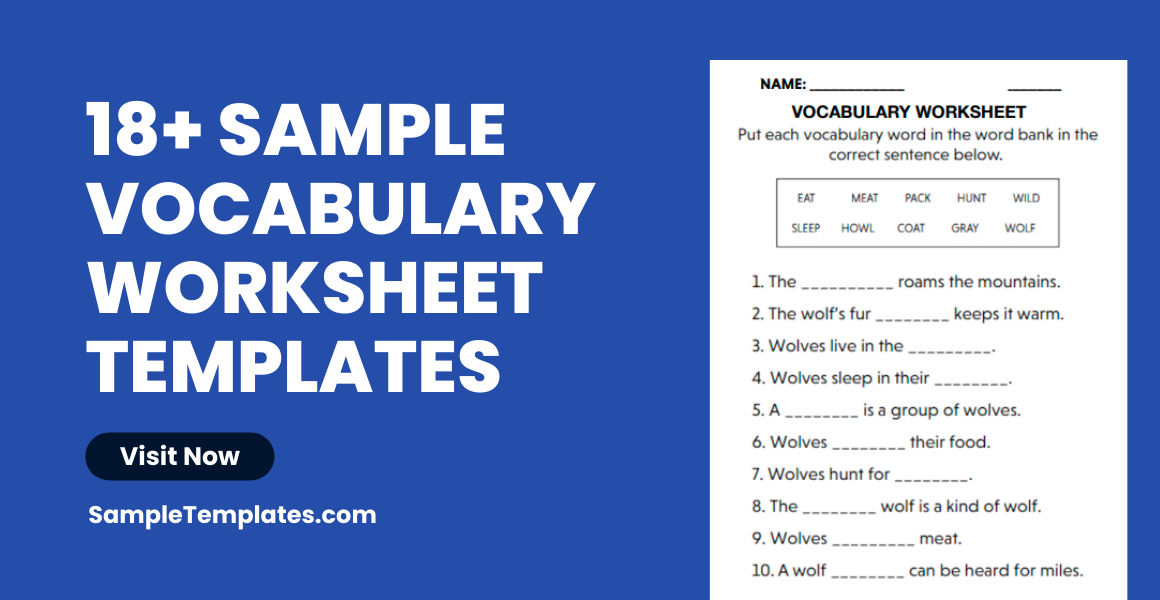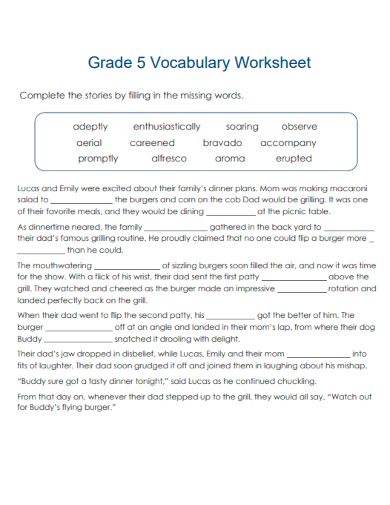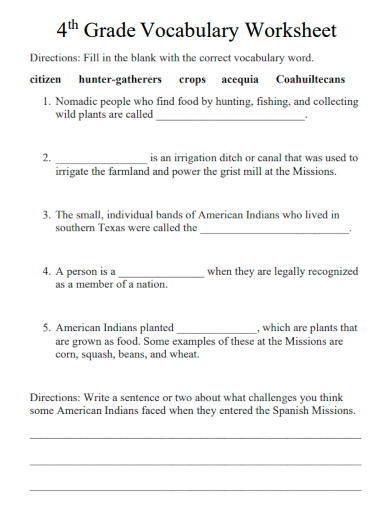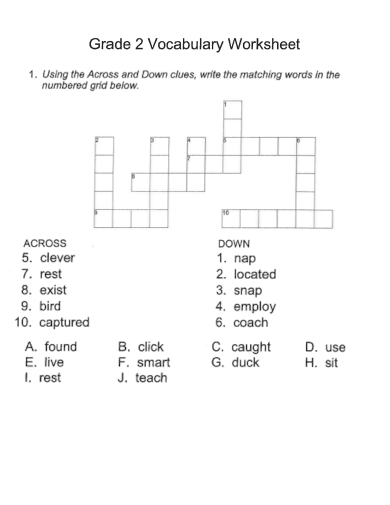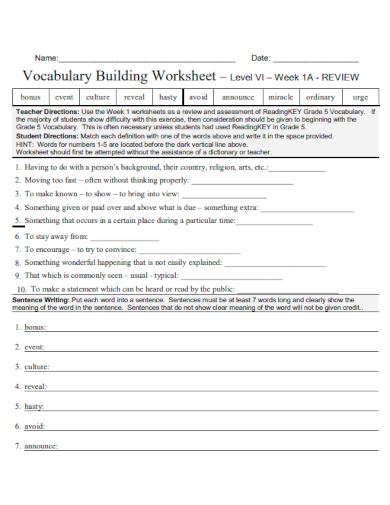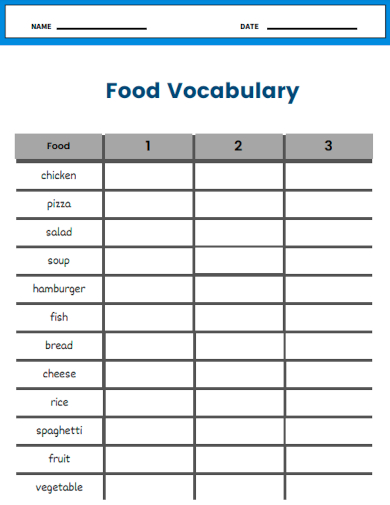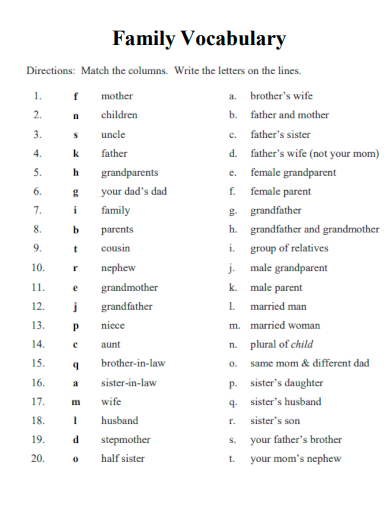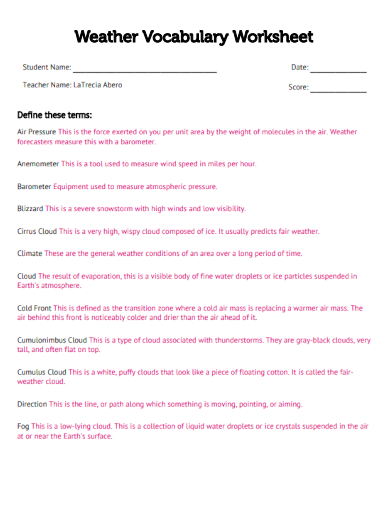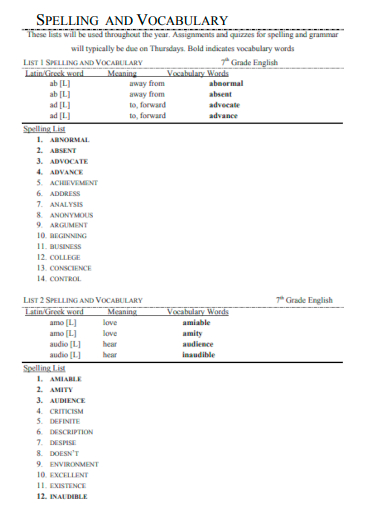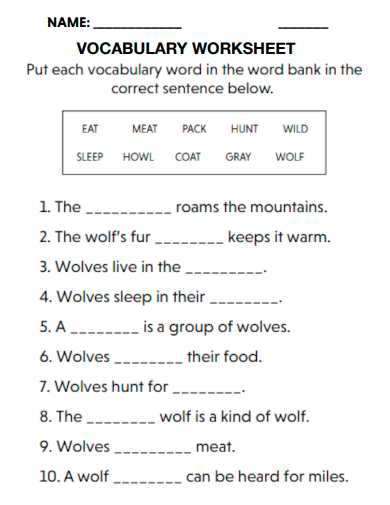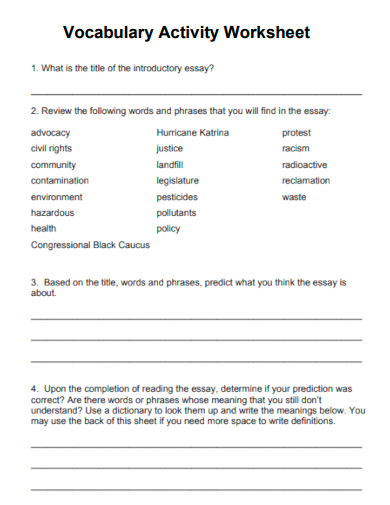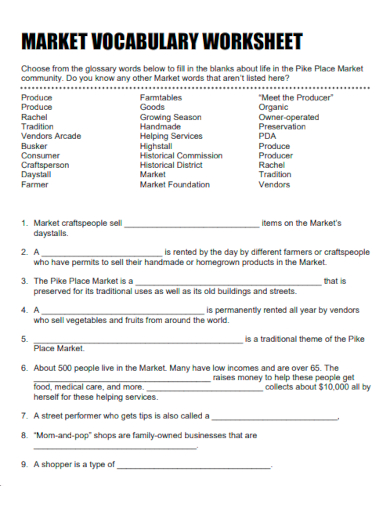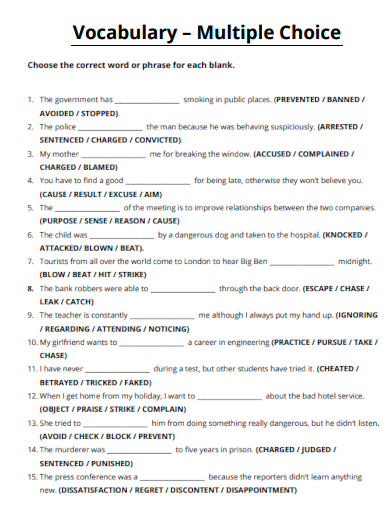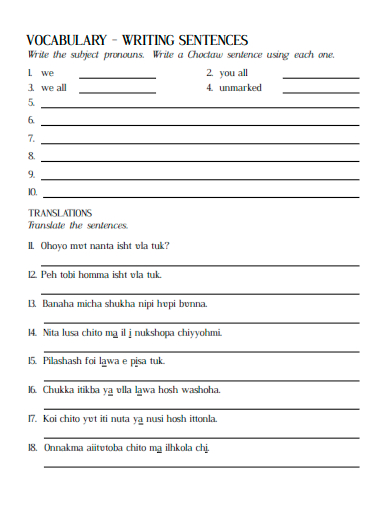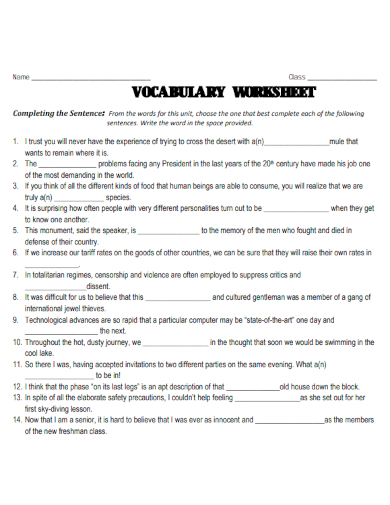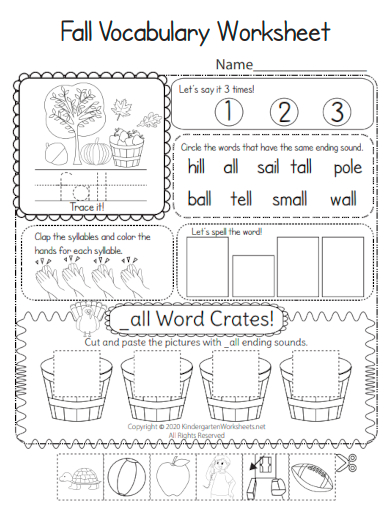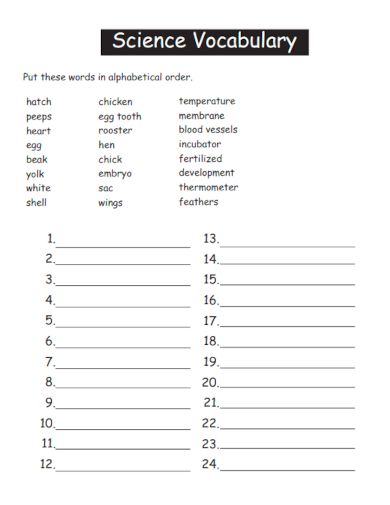Welcome to our comprehensive Vocabulary Worksheet Template, designed to empower your language skills! Whether you’re a student aiming to ace exams, a professional looking to enhance communication, or simply someone passionate about words, this resource is your key to success. Dive into a world of enriching exercises, engaging activities, and a treasure trove of words. Unlock the door to articulate expression and boost your confidence. Explore our Vocabulary Worksheet Template today, and embark on a journey to linguistic excellence!
FREE 18+ Vocabulary Worksheet Samples
1. Sample Vocabulary Worksheet Template
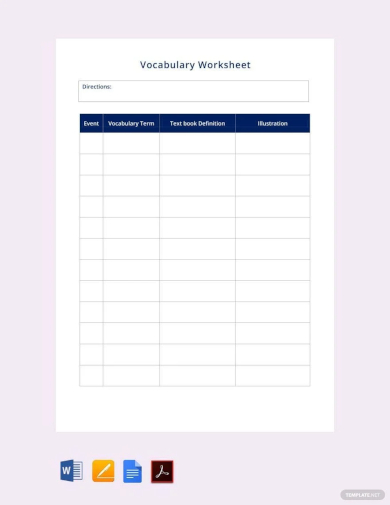
2. Sample English Vocabulary Worksheet Template
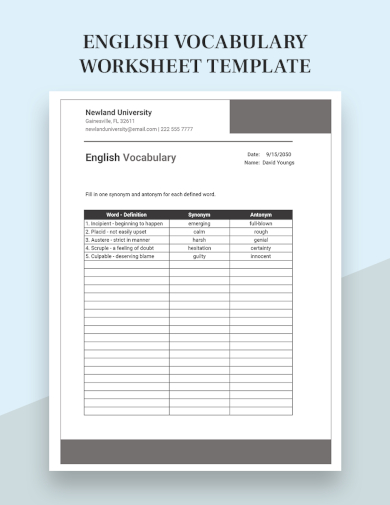
3. Sample 6th Grade Vocabulary Exercises Worksheet Template
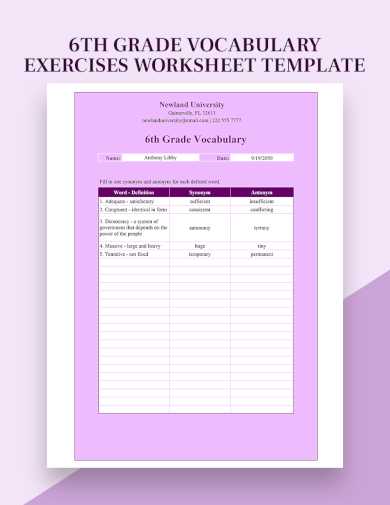
4. Sample Grade 5 Vocabulary Worksheet Template
5. Sample 4th Grade Vocabulary Worksheet Template
6. Sample Grade 2 Vocabulary Worksheet Template
What is a Vocabulary Worksheet?
A vocabulary worksheet is a valuable educational tool designed to help individuals expand their understanding and command of language. These worksheets serve as practical aids for language learners, educators, and anyone seeking to enhance their verbal and written communication skills.
Vocabulary worksheets typically consist of a series of exercises and activities centered around words, their meanings, usage, and context. Here’s a detailed exploration of what a vocabulary worksheet encompasses:
Word Lists: Vocabulary worksheets often begin with lists of words. These words can be organized by theme, difficulty level, or specific subject matter, depending on the intended learning objectives. Word lists act as a foundation for the subsequent exercises.
Definitions: To develop a strong vocabulary, it’s crucial to understand the meanings of words. Worksheets include sections where learners can match words with their corresponding definitions. This reinforces the comprehension of individual words.
Synonyms and Antonyms: Building vocabulary also involves discovering synonyms (words with similar meanings) and antonyms (words with opposite meanings). Worksheets include exercises where learners find synonyms and antonyms for given words, broadening their word choice and language flexibility.
Usage in Sentences: Effective communication requires not only knowing the meanings of words but also using them correctly in sentences. Vocabulary worksheets often contain sentence completion or sentence creation exercises that encourage learners to apply newly acquired words in context.
Word Context: Understanding how words are used in real-life situations is essential. Worksheets may provide sentences or short passages where learners must identify the meaning of a word based on its context.
Crossword Puzzles and Word Searches: To make learning engaging, some worksheets incorporate crossword puzzles and word searches related to the vocabulary theme. These activities reinforce vocabulary while also enhancing problem-solving skills.
Fill in the Blanks: Blank spaces within sentences are provided for learners to insert appropriate words from the word list. This helps in understanding how words fit within sentences and paragraphs.
Root Words and Affixes: Vocabulary worksheets may introduce the concept of root words and affixes, enabling learners to decipher the meanings of unfamiliar words by breaking them down into their constituent parts.
Idioms and Phrases: In addition to individual words, worksheets might include idiomatic expressions and phrases, helping learners navigate the nuances of figurative language.
Self-Assessment: Many worksheets conclude with self-assessment sections, allowing learners to evaluate their progress and identify areas that require further attention.
Personalization: Some worksheets encourage learners to create their word lists based on their interests or specific needs, promoting a more personalized learning experience.
Vocabulary worksheets are versatile resources, catering to various learning styles and levels, from elementary school students building foundational language skills to adults aiming to enhance their professional or academic communication abilities. They play a vital role in language acquisition, promoting active engagement, retention, and practical application of new words, ultimately leading to improved verbal and written expression.
7. Sample Vocabulary Building Worksheet Template
8. Sample Food Vocabulary Worksheet Template
9. Sample Family Vocabulary Worksheet Template
10. Sample Weather Vocabulary Worksheet Template
11. Sample Spelling Vocabulary Worksheet Template
12. Sample Blank Vocabulary Worksheet Template
13. Sample Vocabulary Activity Worksheet Template
How to Make a Vocabulary Worksheet?
Creating a vocabulary worksheet is a structured process that involves careful planning and consideration of the learning objectives. Whether you’re a teacher preparing materials for your students or an individual looking to enhance your vocabulary skills, here’s a comprehensive guide on how to create an engaging and effective vocabulary worksheet:
Define Your Learning Objectives:
Begin by clearly outlining your educational goals. Determine what specific outcomes you want to achieve with the vocabulary worksheet. Are you focusing on a particular theme, difficulty level, or language skill, such as synonyms, antonyms, or context analysis? Having well-defined objectives will guide the creation process.
Choose Your Vocabulary Words:
Carefully curate a list of words that align with your learning objectives. Consider the age group or proficiency level of your target audience and the context in which they will use these words. Select words that are relevant and meaningful to them.
Organize the Worksheet:
Create a logical and structured layout for your worksheet. Use headings, subheadings, and sections to help learners navigate through the exercises seamlessly. A well-organized worksheet enhances comprehension and engagement.
Provide Definitions:
Include clear and concise definitions for each vocabulary word. Ensure that these definitions are age-appropriate and written in a way that is easy for your learners to understand. The definitions should capture the core meaning of each word.
Create a Variety of Exercises:
Design a range of interactive exercises and activities that reinforce the meanings and usage of the selected words. Common exercise types include:
Matching words with their definitions.
Identifying synonyms and antonyms.
Completing sentences with the correct vocabulary word.
Analyzing words in context.
Constructing sentences using vocabulary words.
Engaging in word-based puzzles like crossword puzzles or word searches.
Unscrambling letters to form vocabulary words.
Include Examples:
Provide illustrative example sentences for each vocabulary word to demonstrate how they are used in context. Real-life examples help learners grasp the practical applications of the words.
Consider Context:
If appropriate for your learners’ proficiency level, include sentences or passages where they must use the vocabulary words in context. This contextual practice enhances their ability to apply the words in their own writing and communication.
Add Visual Elements:
Enhance the visual appeal and comprehension of your worksheet by incorporating relevant images or icons that correspond to the vocabulary words. Visual aids can make the learning experience more engaging and memorable.
Include an Answer Key:
If the worksheet is intended for self-study, provide an answer key. An answer key enables learners to independently check their work and monitor their progress.
Format and Design:
Pay careful attention to the overall formatting and design of the worksheet. Use a legible font and consider the visual aesthetics to make the worksheet visually appealing and user-friendly.
Provide Clear Instructions:
Accompany each exercise with clear and concise instructions. Ensure that learners understand the expectations and guidelines for each activity.
Customize for Your Audience:
Tailor the worksheet to suit the age, language proficiency, and interests of your target audience. Consider their existing knowledge and adapt the difficulty level accordingly to create a worksheet that resonates with them.
Test and Revise:
Before finalizing your worksheet, consider testing it with a small group of learners if possible. Gather their feedback and use it to make any necessary revisions or improvements to the worksheet’s content and usability.
Distribute or Share:
Once your vocabulary worksheet is complete and polished, distribute it to your students or share it with your intended audience, making sure it reaches those who will benefit from it.
Creating a vocabulary worksheet that effectively supports vocabulary acquisition requires meticulous planning, clarity, and alignment with your educational objectives. By following these steps and catering to the needs of your learners, you can craft a valuable resource that promotes vocabulary development and language enhancement.
14. Sample Market Vocabulary Worksheet Template
15. Sample Multiple Choice Vocabulary Worksheet Template
16. Sample Vocabulary Writing Sentences Worksheet Template
17. Sample Vocabulary Worksheet Basic Template
18. Sample Fall Vocabulary Worksheet Template
19. Sample Science Vocabulary Worksheet Template
Why are Vocabulary Templates Important
Vocabulary templates play a crucial role in language education and communication development for various reasons. They serve as structured frameworks or guides that facilitate the systematic exploration and acquisition of new words and phrases. Here’s an in-depth look at why vocabulary templates are essential:
Structured Learning: Vocabulary templates provide a well-organized framework for learning new words. They present words in an orderly manner, making it easier for learners to grasp and retain information. This structured approach ensures that learners do not miss essential words or concepts, leading to more comprehensive language development.
Clear Objectives: Templates typically come with predefined objectives or learning goals. These objectives clarify what learners are expected to achieve, helping to keep the learning process focused and goal-oriented. Clear objectives provide a sense of direction and purpose to vocabulary acquisition.
Consistency: Vocabulary templates promote consistency in language learning. By following a set format, learners can apply the same approach to studying different sets of words. This consistency aids in effective learning and retention.
Variety of Exercises: Templates often include a variety of exercises and activities to reinforce word meanings and usage. These exercises cater to different learning styles and preferences, ensuring that learners with various strengths and weaknesses can benefit from the template.
Enhanced Comprehension: Vocabulary templates typically include definitions, example sentences, synonyms, antonyms, and context sentences. These components enhance comprehension by providing learners with a comprehensive understanding of each word’s meaning and usage.
Active Engagement: Templates encourage active engagement with vocabulary. Learners are not merely passive recipients of information but actively participate in exercises like matching words to definitions, creating sentences, or solving puzzles. This active involvement promotes better retention.
Self-Paced Learning: Vocabulary templates are versatile tools suitable for self-paced learning. Learners can work through the templates at their own speed, revisiting challenging words or concepts as needed. This flexibility accommodates individual learning preferences and schedules.
Customization: Many vocabulary templates can be customized to suit specific learning goals, age groups, or proficiency levels. This adaptability ensures that learners receive content tailored to their needs, making the learning experience more relevant and effective.
Vocabulary Expansion: Vocabulary templates introduce learners to new words and phrases they might not encounter otherwise. This expansion of vocabulary is vital for improved communication skills, academic success, and professional development.
Confidence Building: As learners successfully complete exercises in vocabulary templates, they gain confidence in their language skills. This increased confidence encourages them to use their expanded vocabulary in real-life situations.
Academic and Professional Success: A robust vocabulary is an asset in academia and the professional world. Vocabulary templates equip learners with the language skills necessary to excel in their studies, exams, and careers.
Lifelong Learning: Vocabulary templates promote a culture of lifelong learning. They instill the habit of regularly enriching one’s vocabulary, which is essential in an ever-evolving world where language trends and terminologies continually evolve.
Improved Communication: A rich vocabulary enhances communication by allowing individuals to express themselves more precisely and eloquently. This, in turn, fosters better understanding and effective interpersonal relationships.
Cultural Understanding: Vocabulary templates often include context sentences that expose learners to the cultural and contextual nuances of language. This understanding is valuable for comprehending literature, media, and diverse forms of communication.
Language Mastery: Over time, consistent use of vocabulary templates can lead to language mastery. Learners who engage with vocabulary templates regularly develop a deep understanding of words and their usages, approaching fluency in their chosen language.
In summary, vocabulary templates are invaluable tools for language learners, educators, and anyone seeking to enhance their linguistic abilities. They offer a structured and comprehensive approach to vocabulary acquisition, leading to improved communication, academic achievement, career success, and a lifelong appreciation for language and its complexities.
Related Posts
FREE 30+ Development Worksheet Samples in PDF | MS Word
FREE 33+ Course Worksheet Samples in PDF | MS Word
FREE 16+ Verification Worksheet Samples in PDF | MS Word
FREE 14+ Feedback Worksheet Samples in PDF | MS Word
FREE 50+ Assessment Worksheet Samples in PDF | MS Word
FREE 25+ Campaign Worksheet Samples in PDF
FREE 50+ Application Worksheet Samples in PDF | MS Word
FREE 10+ Distribution Worksheet Samples in PDF
FREE 10+ Family Worksheet Samples in PDF
FREE 10+ Personal Worksheet Samples in PDF
FREE 7+ Depreciation Worksheet Samples & Templates in PDF | MS Word
FREE 10+ Typing Worksheets Samples in PDF | DOC
FREE 10+ Maths Worksheets Samples in PDF | DOC
FREE 10+ 4th grade Worksheets Samples in PDF
FREE 10+ Expense Worksheet Samples in PDF
